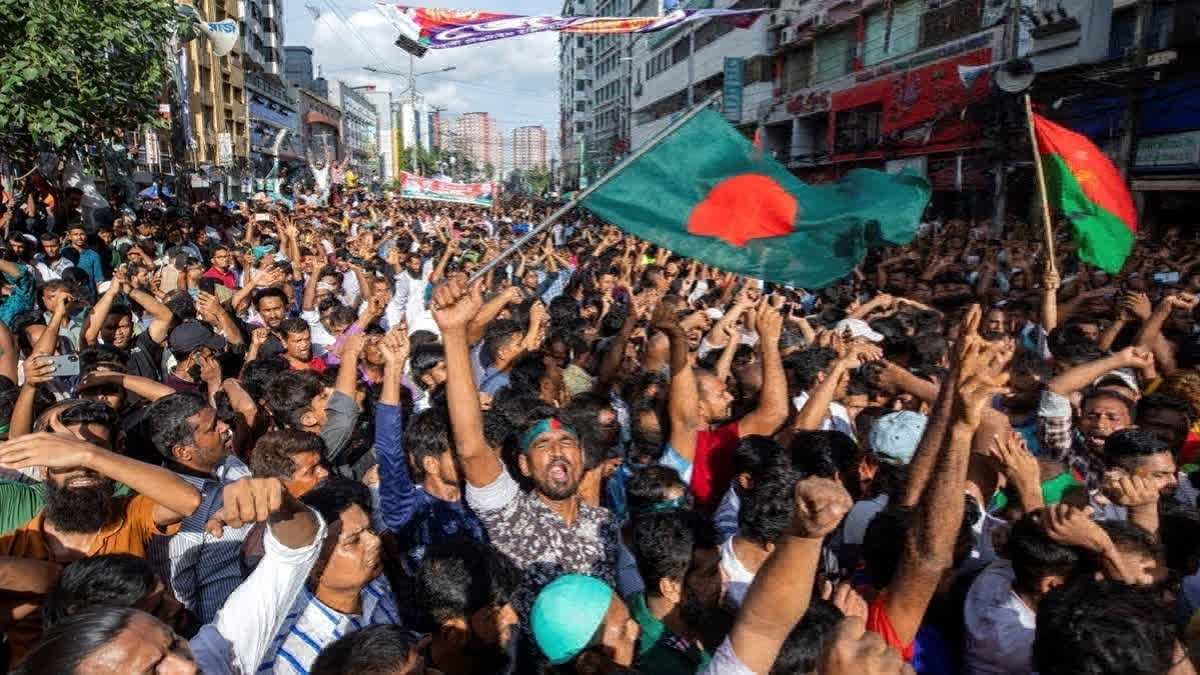New Delhi:Tension is rising in Bangladesh’s political landscape as the Bangladesh Nationalist Party (BNP) expresses growing concern over the emergence of a new political force.
Likely to be formed by students who spearheaded the Anti-Discrimination Students’ Movement during the summer of 2024 that led to the overthrow of the Awami League government led by Prime Minister Sheikh Hasina, this group is now eyeing a larger role in the country’s parliamentary elections. The BNP, long a major player in the nation’s politics, is wary of the potential challenge posed by this new faction, fearing that it could siphon away critical support and alter the dynamics ahead of a fresh high-stakes parliamentary elections.
The Jatiya Nagorik Committee, a Bangladeshi political platform formed in the aftermath of the July 2024 Revolution with a view to building consensus on rebuilding Bangladesh as an inclusive democracy following the ouster of Hasina, said earlier this week that it and the Anti-Discrimination Students’ Movement will announce a moderate political party by next February.
“The political party that is coming in the next month is going to emerge under the initiative of the Jatiya Nagorik Committee and the Anti-Discrimination Student Movement,” Jatiya Nagorik Committee member secretary Akhtar Hossain said while interacting with journalists during a public meeting at Kaunia Bazar in Rangpur on Thursday. “We hope to see that political party by February.”
Hossain also stated that the Awami League would not be allowed to return to politics “until the trial of the heinous genocide committed by killer Hasina and her associates in Bangladesh”.
“The people of Bangladesh will deploy all their strength against those who are trying to bring them to the polls,” he said. “If we see any activities of fallen fascists in Bangladesh, whether on Facebook or elsewhere, we will ask the enforcers to take stern action against them.”
Since the parliamentary elections in January 2024, Bangladesh has been embroiled in significant political turmoil, marked by widespread protests, allegations of electoral fraud, and growing unrest. Many opposition parties, including the BNP that boycotted the polls, accused the ruling Awami League of using state machinery to secure an unfair victory.
The political crisis also attracted the attention of international actors, especially Western governments and organisations that have expressed concerns over the integrity of the 2024 elections. The US and the European Union had criticised the lack of transparency and the suppression of opposition forces, while calling for the restoration of democratic norms.
After Hasina’s election as Prime Minister for a fourth time in a row in January last year, her popularity ratings fell because of what people saw as her autocratic style of functioning. An anti-job quota movement started by students in Bangladesh in June blew up into a full-fledged revolution involving Islamist fundamental elements against Hasina’s Awami League government forcing her to flee to India on August 5.
The next day, Bangladesh President Mohammad Shahabuddin dissolved the country’s parliament and on August 8 installed an interim government headed by Nobel laureate Muhammad Yunus as Chief Adviser.
Now, even as he announced the likely formation of a new political party by February, Jatiyo Nagorik Committee’s Hossain has also subtly targeted the BNP ahead of new parliamentary elections saying that the main opposition party did not participate in the elections of 2014, 2018 or 2024 because of which elections have been proven to be one-sided affairs. He said that the new party would emerge from a moderate political practice in Bangladesh.
“We will not tolerate the long-standing Islamophobia in Bangladesh,” he stated. “Similarly, we will not tolerate Hindu extremism or Muslim extremism.”
In the wake of this, Tarique Rahman, son of BNP leader and former Prime Minister Khaleda Zia, said that though the student leaders are welcome to form a new political party, it would disappoint the people if it is seen to enjoy the state and current administration’s support.
“If any of these young people, deprived of democratic and political rights, form a new political party to establish the rights of the people, BNP certainly welcomes the initiative,” the Daily Messenger quoted Rahman as saying during a discussion on Saturday via virtual mode from London. “But if anyone seeks help from the state and administrative support to form a political party, it will disappoint the people.”
